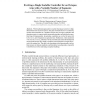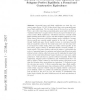553 search results - page 55 / 111 » A General Theory of Additive State Space Abstractions |
POPL
2009
ACM
14 years 9 months ago
2009
ACM
The call-by-need lambda calculus provides an equational framework for reasoning syntactically about lazy evaluation. This paper examines its operational characteristics. By a seri...
PPSN
2010
Springer
13 years 7 months ago
2010
Springer
Abstract. While traditional approaches to machine learning are sensitive to highdimensional state and action spaces, this paper demonstrates how an indirectly encoded neurocontroll...
GECCO
2006
Springer
14 years 10 days ago
2006
Springer
The properties of symmetric fitness functions are investigated. We show that a well-known encoding scheme inducing symmetric functions has the non-synonymous property and the sear...
SAGT
2010
Springer
13 years 7 months ago
2010
Springer
Abstract. We consider the existence of Partition Equilibrium in Resource Selection Games. Super-strong equilibrium, where no subset of players has an incentive to change their stra...
CORR
2007
Springer
13 years 8 months ago
2007
Springer
Abstract. Sequential game and Nash equilibrium are basic key concepts in game theory. In 1953, Kuhn showed that every sequential game has a Nash equilibrium. The two main steps of ...


